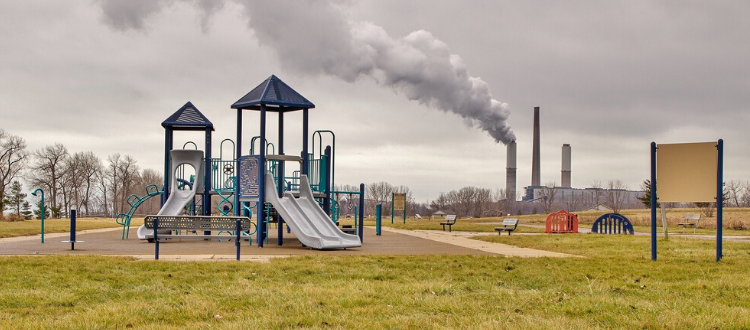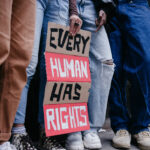EPA Weakens Protections as Studies Link Pollution to Higher COVID-19 Death Rates
 |
| Jamie McConnell Director of Programs & Policy |
Recently the Environmental Protection Agency announced a temporary policy in response to the COVID-19 Pandemic that essentially absolves polluting industries from meeting environmental standards during the crisis and states the agency will not seek penalties for noncompliance with routine monitoring and reporting requirements.
It’s outrageous that the agency charged with “protecting human health and the environment” is giving industries a pass to not comply with regulations intended to protect human health from the very air pollutants that are making people more susceptible to contracting and dying from Covid-19.
Undoubtedly, this policy will have the most impact on fenceline communities, the communities that are living right next to chemical facilities. According to the report Life at the Fenceline, 39% of the population or 124 million people live within 3 miles of one of the 12,500 high risk chemical facilities located in the US. And, a disproportionate number of these communities are predominantly people of color and low income. These communities have long been overburdened and underserved. Communities living on the fenceline have higher rates of respiratory illnesses ; air pollution can worsen or instigate chronic conditions such as asthma, chronic obstructive pulmonary disease (COPD), heart disease, hypertension, and diabetes.
A healthcare data firm, Jvion, recently launched a COVID-19 community vulnerability map that identifies communities likely to suffer serious complications and possibly higher mortality rates from COVID-19. The map is based on different factors like exposure to toxins, access to transportation, and unemployment. Communities on the fenceline, like the communities living along “cancer alley,” — an area along the Mississippi River between Baton Rouge and New Orleans where there is a high number of chemical facilities — are identified as having a higher risk for severe outcomes of COVID-19. Already, the area has one of the highest mortality rates for COVID-19 in the country.
It’s impossible to predict what kind of impact the EPA’s lack of enforcement will have in the short-term and it’s unlikely that all or even most chemical facilities won’t continue to comply with reporting, monitoring and emissions controls and requirements. However, it’s within the realm of reason that emissions may increase in some communities, and as a result people living on the fenceline could experience more acute impacts of pollution—for example more frequent asthma attack or respiratory infections that could lead to increased hospitalizations (and now certainly isn’t the time where more strain should be put on hospitals).
The EPA is unsurprisingly receiving backlash to this temporary policy. In response, the EPA says that the agency “continues to enforce environmental laws”. The problem is, there is a serious lack of parameters around company accountably, and the limits outlined in the temporary policy (including no end date). It’s worth noting that the agency’s policy came just a few days after a request from the American Petroleum Industry that the agency suspend its rules
A former EPA staffer who now works for Earthjustice notes that it’s not unusual for the EPA to suspend enforcement of environmental laws “in very limited ways and under very specific circumstances” when noncompliance “is narrow, unavoidable and unforeseeable.” But, while temporary, this current policy has virtually no limits, no end-date, making it easy for industry to abuse. For example, the policy isn’t limited to specific facilities or facilities types, nor does it include any geographical boundaries and essentially allows industry to “justify any and all noncompliance with any environmental regulation.” What’s more, those who are living near a facility will have no way to know whether a refinery, for example, has decided to not perform maintenance that would reduce emissions of toxic gases.
Certainly, it’s not unreasonable for the EPA to create some allowances to accommodate worker shortages and to ensure workers are protected, but this temporary policy is grossly negligent in its lack of prescriptiveness. The EPA can, and should, do better.
This decision was made amidst rising evidence of links between the impact of long-term air pollution and deaths from COVID-19 and is an affront to the communities who are literally fighting for their lives because of the long-term impacts these facilities are having on their health, not to mention the impact the virus is already taking on fenceline communities.
The pandemic has shined a light on the deep inequities that exist within our country. It’s not that we didn’t know they were there before, but when crisis hits it’s often those with less wealth and people of color who are overburdened by its impact and that has become horrifically clear in the time of Covid. Black Americans are dying at higher rates. Lack of healthcare, lack of access to paid time off, lack of running water, pollution, are all social inequities that are contributing to the spread and mortality rate of the virus.
And now, in the face of it, the EPA wants to give a pass to industries that have been responsible for exposing communities to long-term air pollution that is making them more likely to contract and die from COVID-19. It flies in the face of reason.
What this disease has made potently obvious is the impacts pollution is having on our health. We have a responsibility to ensure everyone, regardless of race or income, has the right to live in a healthy environment. The EPA, which is mandated to uphold the laws and regulations that protect public health, need to do their job. Tell EPA to revise the temporary policy to include more limitations and parameters for industry to follow during this crisis (action below).
Another way you can support fenceline communities is by making a donation to the Environmental Justic Health Alliance. Please consider doing so today.






